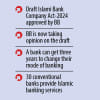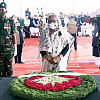PM steps in to ensure smooth food supply


Prime Minister Sheikh Hasina yesterday instructed Bangladesh Bank to intervene if any bank faced a dollar shortage while opening letters of credit for importing food, fertiliser and other agricultural inputs to ensure uninterrupted food supply.
The directive came at a meeting at the Gono Bhaban with secretaries and other top government officials to review the overall situation of the economy, which is under strain.
Disruptions in global supply chain due to coronavirus pandemic and the Russia-Ukraine war have resulted in increased prices of goods, causing Bangladesh's foreign exchange reserves to deplete.
As of November 3, the central bank has foreign currency reserves of $35.7 billion, which is enough to meet about four months' import bills.
This has prompted the BB to cut back on its open market sales of the dollar, which, in turn, put banks in a tight spot when it comes to opening new LCs.
To ensure that importers of food, fertiliser and other agricultural inputs are not turned away by the banks, the PM gave the directive.
Hasina has also ordered strict monitoring of the social safety net programmes to ensure that poor people are not deprived, The Daily Star has learnt from people familiar with the discussions, who requested anonymity to disclose sensitive deliberations.
She also said the government would continue to subsidise agricultural inputs while cutting back the subsidies on LNG and electricity.
At the meeting, Commerce Secretary Tapan Kanti Ghosh said the Trading Corporation of Bangladesh would need Tk 5,280 crore a year to continue selling essential goods at lower prices to one crore low-income families across the country.
In response, the PM said funds would be made available to continue the operation.
Ghosh informed the PM that the waiver of tax, value-added tax and supplementary duties on some food items had helped reduce the prices of those items.
The PM then ordered examining whether such measures can be taken on more food items.
On October 26, the PM met with importers and asked them to ensure that food items are available to consumers at fair prices and urged them not to make excessive profits. The importers requested her to withdraw the VAT on imported essential commodities.
At that meeting, the importers told the PM that some private banks were reluctant to open LCs saying that they did not have enough dollars. Hasina then said she would sit with finance ministry higher-ups and the BB governor to solve the problem.
Also at yesterday's meeting, the PM asked the authorities concerned to reduce the gap between export earnings and import payments.
In September, imports stood at about $7 billion, exports $3.9 billion and remittance $1.5 billion.
Subsequently, the current account balance sank further in the red, heaving pressure on the exchange rate that is trading at record lows against the US dollar.
The current account records a country's transactions with the rest of the world, specifically its net trade in goods and services.
At the end of September, the current account was $3.6 billion in deficit in contrast to a shortfall of $2.5 billion a year earlier.
As a result, the supply of dollars is constricting. On November 3, each dollar traded for Tk 105.7, up 23 percent from a year earlier.
At yesterday's meeting, Bangladesh Bank Governor Abdur Rouf Talukder said fewer LCs were being opened at the banks and its benefit to the economy will be felt by January.
As the PM wanted to know about remittance flow, Talukder said the flow through banks had declined because of hundi, an illegal cross-border financial transaction.
In October, the official remittance inflows dropped for the second consecutive month.
Hasina then ordered the authorities concerned to find out the beneficiaries of the hundi cartel.
She also asked the commerce ministry to increase the import tariffs on 40 luxury goods.
The PM also ordered expanding the list of less essential products imported from abroad.
The commerce ministry recently sent a list of 340 less essential items to the National Board of Revenue, which would take measures to discourage their imports.
Ahmad Kaikaus, the PM's principal secretary; Fatima Yasmin, finance secretary; Habibur Rahman, power secretary; Ismiel Hossain, food secretary; and Zakia Sultana, industries secretary, were present among others at the meeting.


 For all latest news, follow The Daily Star's Google News channel.
For all latest news, follow The Daily Star's Google News channel. 








Comments